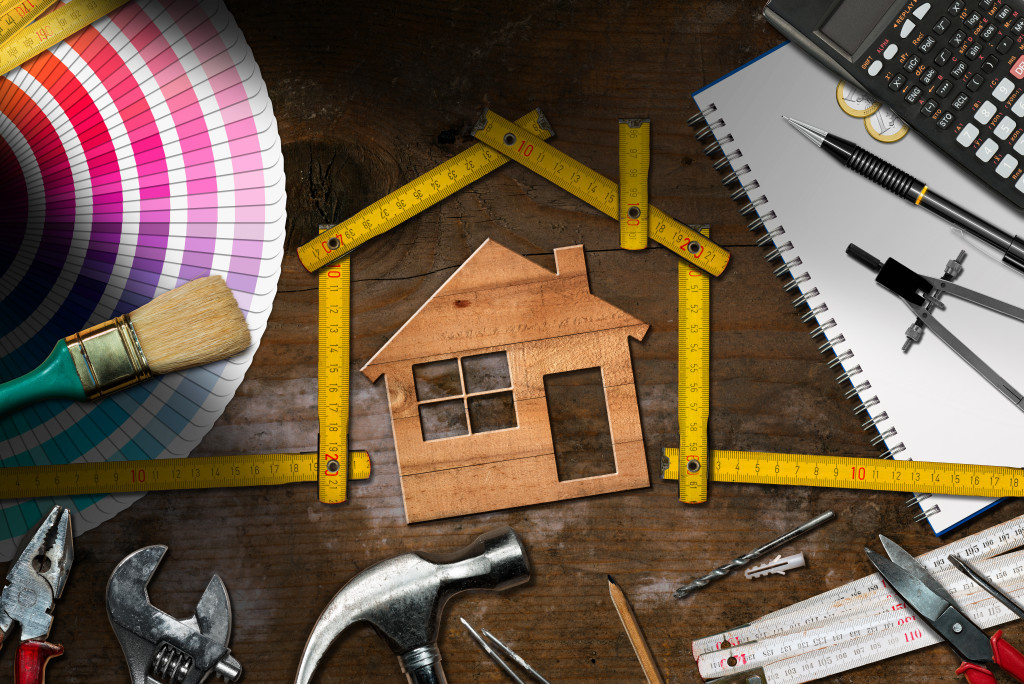- Understand home renovation rules and regulations, such as building permits, electrical permits, plumbing permits, and demolition permits.
- Consider zoning laws to ensure projects are compliant with local regulations.
- Hire contractors with adequate insurance and the necessary licensing and permits.
- Establish contractual obligations for project timelines and payment terms.
- Use boundary survey services to protect against potential legal action from neighbors.
Home renovations can be an excellent way for homeowners to increase the value of their property, both financially and aesthetically. A home renovation can range from minor interior updates, such as painting walls or replacing flooring, to more significant structural projects, such as adding an addition, remodeling a bathroom, or installing a new roof. Renovations can help improve the quality of life for homeowners by providing more living space and increasing comfort in the home.
From an investment standpoint, renovating your home can add significant value to the property. According to Zillow’s 2019 Consumer Housing Trends Report, 39% of homeowners performed at least one major renovation project. On average, those who completed a significant renovation recouped 73.3% of that cost when they sold the home.
Renovations can be ideal for homes, but it’s essential to understand the legal implications of such projects. Before beginning any upgrades, here are a few things to consider.
Construction Regulations
Homeowners must understand home renovation rules and regulations to ensure their project meets all applicable requirements. Below are some permits that may be necessary when undertaking a renovation project.
Building Permit
A building permit is required when making significant changes or additions to your home. This permit must be obtained from local government authorities before construction can begin and covers everything from structural changes to electricity and plumbing work. The key will also provide specific instructions on how construction should be completed and set forth any other applicable regulations for you to obtain a certificate of occupancy at its conclusion.
Electrical Permit
You will need an electrical permit if you plan on doing any electrical work during your renovation, such as adding outlets or wiring new lighting fixtures. Electrical permits must be obtained from local authorities and require detailed plans outlining the work scope and any safety measures that must be taken while carrying out these projects.
Plumbing Permit
Any plumbing work requires a permit, including installing or replacing pipes, water heaters, or sewage systems. Plumbers are typically required to obtain this permit before beginning any installation or repair jobs due to specific local regulations and codes that must be adhered to for these projects to pass inspection.
Demolition Permit
If you plan on demolishing a part of your existing home to make way for renovations, a demolition permit will likely need to be obtained from local authorities before proceeding with this project. Demolition permits have specific safety protocols that must be followed throughout the demolition process to move smoothly and without incident.
Zoning Laws

It’s also important to consider zoning laws when deciding on any renovations. Zoning ordinances will dictate what projects and construction can be done in a particular area. Additionally, some localities restrict the materials that can be used and noise levels allowed during renovation projects. Violating these regulations could result in costly fines or even require you to undo the entire project and start from scratch.
Zoning laws can also affect boundary lines, so using boundary survey services is essential to comply with all relevant regulations. Boundary surveys provide an accurate representation of the boundary lines between adjacent properties. They should be used before any construction begins, as they may help protect homeowners from potential legal action taken by their neighbors.
Contractual Obligations to Contractors

Establishing contractual obligations when hiring contractors for a home renovation project is also essential. Outlining expectations, timelines, and payment terms in writing can help prevent potential disputes from developing. It’s also necessary to ensure the contractor is adequately insured, as this can protect against any accidents or negligence during construction.
Most contractors will also need to be registered with their local government. Check with your area’s building department to confirm that your contractor has the necessary licensing and permits before starting any work. They will likely have their own sets of regulations and codes they must follow to ensure the project meets all local requirements.
Final Thoughts
Anytime you undertake a home renovation, it’s essential to understand the legal aspects involved. Knowing what permits are needed, being aware of zoning laws, and establishing contractual obligations can help ensure your renovation project follows all relevant regulations and is completed successfully. With careful consideration of these issues, homeowners can rest assured their renovations will be done correctly and safely.




